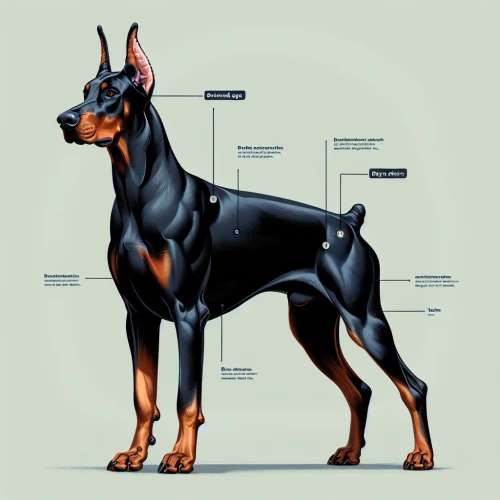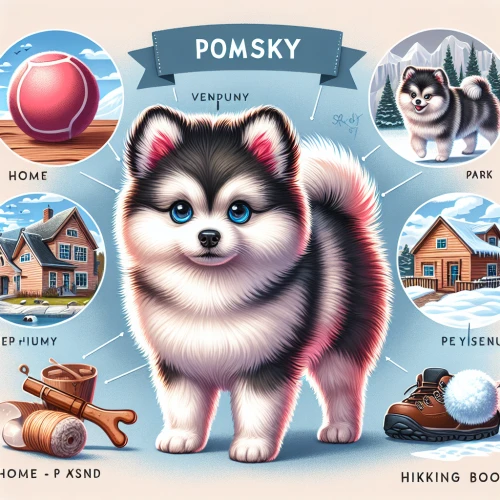Navigating the intriguing world of dog breeds can be quite the adventure, especially when it comes to a breed comparison like Doberman versus Pomsky. These two breeds, each with its distinct traits and charm, offer a wealth of differences in size, temperament, and energy levels. Delving into such a comprehensive comparison provides valuable insights for potential pet owners exploring which furry friend might best suit their lifestyle.
Both breeds are surprisingly affectionate with their loved ones, secretly being big softies at heart. What separates them is their appearance and size, with the Doberman being the larger of the two, and that the Doberman is often aloof with strangers compared to the over-friendly Pomsky.

Understanding the differences between a Doberman and a Pomsky can be crucial. Each breed has unique characteristics, from temperament to energy levels, that might align differently with individual lifestyles. With comprehensive insights, let’s dive into an in-depth comparison of these two fascinating breeds.
| Doberman | Pomsky | |
|---|---|---|
| Hight | 24-26 Inches | 10-15 Inches |
| Weight | 50-100 Pounds | 20-30 Pounds |
| Temperament | Alert, Fearless, Loyal | Alert, Playful, Energetic |
| Energy | High | High |
| Health | Average | Average |
| Grooming needs | Weekly | Weekly |
| Lifespan | 10-14 Years | 12-15 Years |
| Other Pet Friendly | Often | Often |
| Family Friendly | Yes | Yes |
| Trainability | Intelligent, Easy To Train | Moderate, Needs Consistency |
| Puppies Price | $500 And Up | $800 And Up |
Doberman Overview

The Doberman is a historic dog breed that was first developed in Mixed during the 1800s. Their strong protective instincts make them a highly valued breed in both police and military work. Despite their reputation, the Doberman is the 17th most popular dog in the United States.
Personality/Character
Doberman thrive on attention from their families and tend to be very affectionate with them. While they are more reserved around strangers, they can still be sociable if they’re socialized early as puppies. Generally, Doberman don’t interact as well with other dogs as they do with people. They’re often best suited to single-dog households, as they may become competitive and show aggression when vying for attention.
This breed has high exercise requirements but is adaptable to various living situations. Doberman are more than happy to keep you company in a small apartment if you are diligent about taking them out for intense play sessions, bikes, or runs. They rarely bark and are overall quiet dogs.
Doberman have a strong history of being guard dogs because they are alert and aware at all times. It’s not likely that someone will sneak up on you with a Doberman in tow. They are also protective of their pack, which can lead to aggressive behavior if they feel that their family is being threatened.
Training
As a highly intelligent breed, Doberman are fairly Intelligent, Easy To Train. They are eager to please their owners and therefore, learn quickly. These dogs thrive with a job to do, as they are a working breed. It’s best to keep them on their toes by introducing fun activities and training into their routine.
Exercise
If you prefer a calm dog, the Doberman likely isn’t the best breed for you. They need a minimum of High of exercise every day and can resort to destruction if they are cooped up too long indoors.
Health Issues
Doberman have a lifespan between 10-14 Years. Health issues that this breed is prone to include hip dysplasia, heart issues, and thyroid disease.
As large, active dogs, Doberman will require a high-quality, high-protein diet. Their size means they will need about 4 cups of quality dog kibble each day.
Suitable For:
These dogs are suitable for active families with older children, as they can be taught to treat the dog properly. There should also be no other dogs in the household, as it is unlikely that the Doberman will get along with them unless they are raised together.
Pomsky Overview

The origins of the Pomsky can be traced back to the 18th century in the U.K. The breed was developed from the Old English Bulldog and used in the sport of “bull-baiting.” This bloody sport has been banned for decades, but Pomsky haven’t escaped their long-standing reputation as fighting dogs.
Interestingly, the breed was once used as a “nanny” dog to protect young children in wartime. This speaks to their endearing and gentle side and their strong protective instincts.
Personality/Character
Pomsky can easily be described as gentle giants. They are intimidating in appearance but often loving toward their owners. These dogs are energetic and intelligent. They get along with both humans and other dogs alike, but it is critical to properly socialize and train a Pomsky to avoid aggression issues.
This dog breed has a fighting background, and bad ownership and breeding can give them aggressive tendencies. Having a confident, social dog requires good training and exposure to many new situations as a young pup.
Training
Pomsky are relatively easy to train, and starting their training as early as possible is essential. Positive reinforcement and consistency are key. These dogs are up for a challenge. Keeping them busy will help to keep them calm and satisfied.
Exercise
Much like Pomsky , will become destructive if they don’t get enough exercise. These dogs should have a minimum of Intelligent, easy to train of intense exercise each day to stay calm and well-behaved.
Health Issues
The lifespan of a Pomsky is up to 12-16 Years . They are generally healthy dogs, but they are prone to joint problems and are known to be susceptible to hip and elbow dysplasia.
To keep their energy up, Pomsky will need quality, high-protein dog kibble, and you can expect them to consume about 2 ½ cups each day.
Suitable For:
Pomsky are good with families that are active and have older children. Having experience with dog training is also preferable, as these dogs need early training that remains consistent, along with regular socialization.
Price

The average price of a Doberman puppy costs around $500 And Up | and the average price of a Pomsky costs around $800 And Up , both from a reputable breeder. It is important to ensure that you work with a reputable breeder because not only can they provide you with health certificates from both of their parents, but you can also be sure that they have been given the best start to life and they would not have been mistreated in any way.
For those families wishing to adopt the best place to start is to research breed specific rescue centers. The Doberman Pinscher Club of America list rescue centers state by state.
It is always worth noting here that because both of these breeds often fall under BSL, particularly the Pomsky , it is important to check your local laws and understand what this might mean for you, as often there are financial implications to be aware of.
Which Breed Is Right for You?
Both the Doberman and the Pomsky are loyal, loving dogs with bad reputations. They are high-energy dogs that require plenty of exercise and attention. The Doberman is better suited to single-dog homes and tends to act as a guard dog.
The Pomsky is better suited to smaller living situations or homes with other animals, as they are more social by nature. You can be sure that either of these dog breeds will be a rewarding experience for you and your family.
Final Thoughts
The Doberman and the Pomsky are both affectionate and loyal dogs who love their entire human family very much, and would do just about anything for them. They are also both energetic and need to be placed with families that can offer them with plenty of exercise and attention throughout the day.
Whichever breed suits you and your family, you can rest assured that they are both loving breeds that will shower you with equal amounts of love and canine cuddles, and there will never be a dull moment with one of these guys around.










